Sunday's claims of a foreigners' Ecstasy party by a local cable news network, a local newspaper and two Taipei City councilors was likely the result of a bungled political attack on Taipei Mayor Ma Ying-jeou (
The attack was spearheaded by DPP councilors Wang Shih-chien (王世堅) and Yan Sheng-guan (顏聖冠), who assailed Taipei City for lax drug enforcement at the Huashan Arts District at a press conference Sunday afternoon. In recent months, Wang has taken the stance of a moral crusader, repeatedly attempting to embarrass Ma over the presence of sex and drugs in Taipei. Late last year, Wang confronted Ma with cameras and a Japan sex tourist's guide to Taipei. In April, he again tried to discredit the mayor by releasing his own personal blacklist of the top 10 Ecstasy clubs in Taipei.
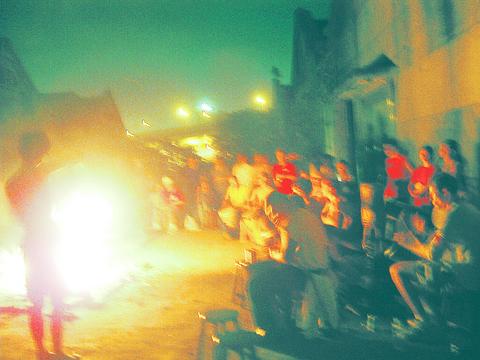
PHOTO: YU SEN-LUN, TAIPEI TIMES
When the councilors learned that the arts district was actually under the administration of the central government, they changed their tack, lashing out at local artists and foreigners, blaming both for local drug problems. The councilors also lambasted the local police precinct, claiming lax enforcement.
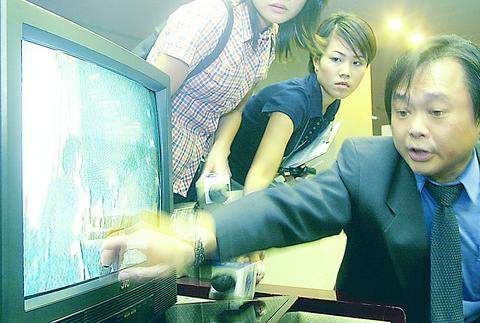
The way the attack was staged, making use of footage taken during the party, which was used at the Sunday press conference and aired on Power News, give grounds for strong suspicion that the city councilors conspired with the cable station to produce a video tape that created the appearance of drug use at the party. Both Power News and Wang deny this, but their stories regarding the origin of the video do not match.
Chou Chen-hou (
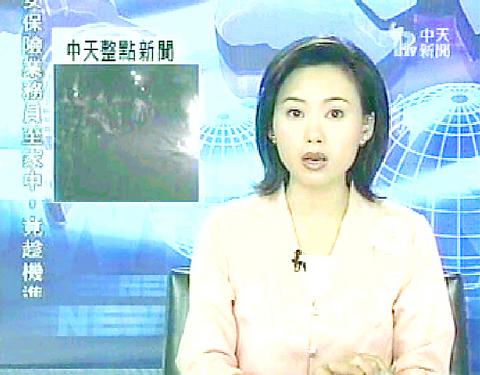
Wang, meanwhile, told Taipei Times that the video tape was given to him on Sunday morning by "a 30-something teacher at a nearby college" who simply could not tolerate the noise and "mad behavior" that took place at Huashan on weekends. Contradicting Power News, Wang said that this mysterious informant had distributed the videotape to both him and "different media." He also claimed to have first decided to hold a press conference after seeing the Power News report.
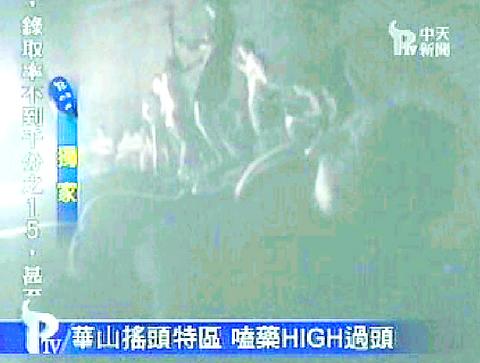
Power News first aired its video at noon Sunday. Wang, accompanied by Yan, displayed his video three and a half hours later at a press conference.
Moreover, the Power News broadcast closely mimicked Wang and Yan's rhetorical strategy for attacking Ma, first making accusations of drug abuse at Huashan, then blaming police and Taipei City for not dealing with the problem.
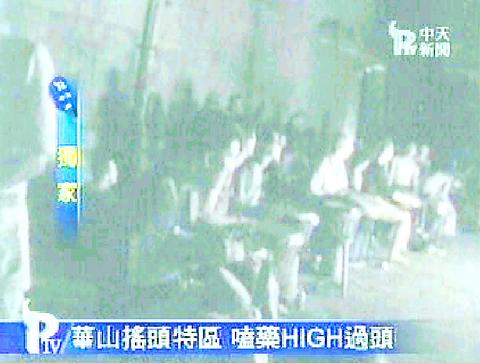
Power News was also the only station to air footage of Wang and Yan's press conference, and later in the day tracked down Mayor Ma for comment on the Huashan incident.
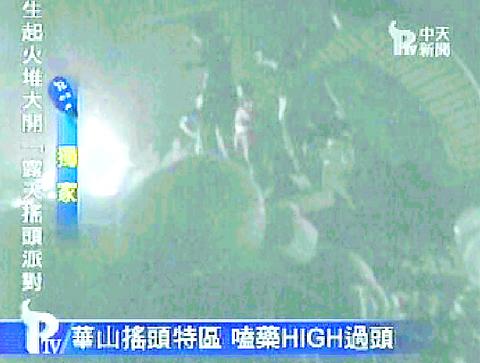
At the Sunday press conference, Wang complained, "Taipei is becoming a foreigners' drug paradise," before going on to compare it to "Shanghai of one hundred years ago."
In regard to the arts district, community and specifically Saturday night's event, he declared, "art is a false name for this, it is actually just about [the drug] Ecstasy!"
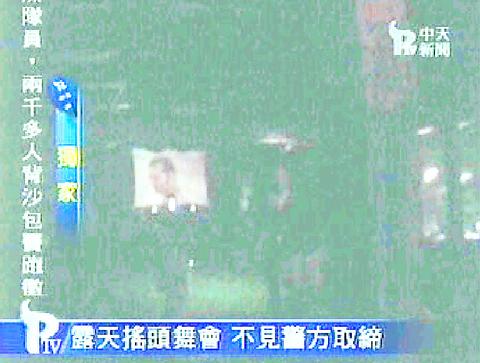
Although Yan, who, like Wang had only seen the videotape, was seen on TV Sunday screaming at event organizers, yelling, "What kind of event is this? People in the middle of the night smoking marijuana and taking Ecstasy!"
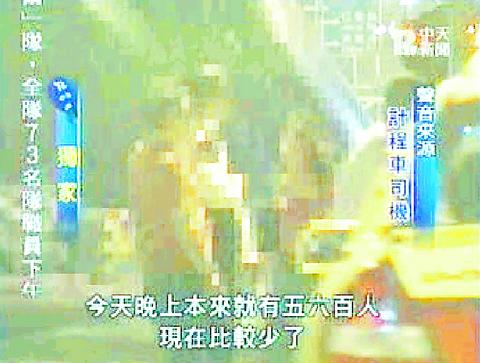
Wang also criticized Taipei City, pointing at the videotape and yelling, "why aren't the police doing anything about this?"
Many of Wang's statements, notably those attacking foreigners and Taipei City government, were mirrored closely in the media. Sunday afternoon and evening, Power News (
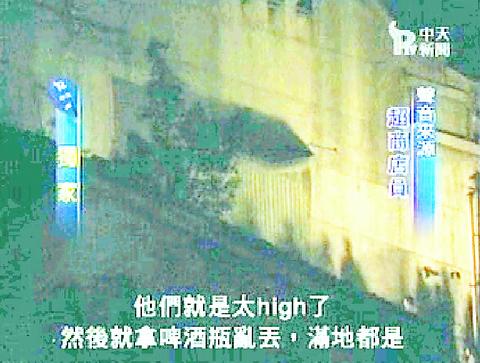
Sunday's front page headline of the China Times Express (
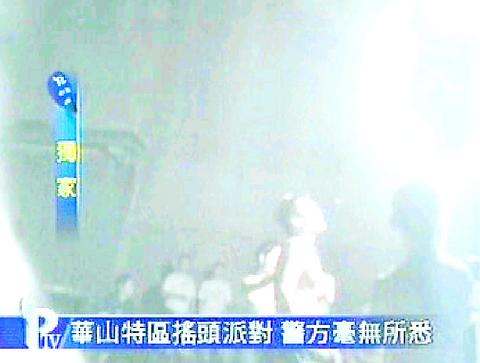
The happening targeted by these reports was an outdoor African drum circle organized by the SunSon Theatre (
Claims made by the city councilors and the media regarding drug use at the event were eventually found to have little or no basis. A patrolling police squad car drove through the event at 10:30pm Saturday night, finding no suspicious behavior. A police report released yesterday declared that no evidence of drugs was found in a search conducted the morning after the party. Police records also show that no complaints of noise or any other disturbance were made by area residents on the night of the event.
Wang's own position as a moral crusaders is also called into doubt. When compiling his black list of clubs in which drug abuse was common, he omitted a club infamous for drug procurement that happens to be located within his election district.
"[One of the discos omitted from the list] is in Wang's election district. Many people believe that he has some sort of connection with that club, but nothing has ever been proved," said one local DJ.
Wang composed his nightspot blacklist through evidence gathered by his aides, who he sent out to "investigate" various discos. He made no mention of using such tactics in obtaining the Huashan video, however.
Subsequent to the reports, Taipei's arts community has attempted to discredit the attacks through a Monday press conference at Huashan and a hearing yesterday at the Legislative Yuan. Even so, those present at Saturday night's drum circle claim that substantial damage has been done by the Power News report that cannot be easily repaired.
"Can you imagine how upsetting it is to be shown on television, to have them say you are on drugs, and to have that be completely untrue?" said Lin Hung-chang (
"Many people were very upset by this. It was very damaging to people who had their faces shown on TV, especially the foreigners. And now, we've shown it's not true, but this story is not even in the news anymore, or else it's buried in the back pages," he said.

May 11 to May 18 The original Taichung Railway Station was long thought to have been completely razed. Opening on May 15, 1905, the one-story wooden structure soon outgrew its purpose and was replaced in 1917 by a grandiose, Western-style station. During construction on the third-generation station in 2017, workers discovered the service pit for the original station’s locomotive depot. A year later, a small wooden building on site was determined by historians to be the first stationmaster’s office, built around 1908. With these findings, the Taichung Railway Station Cultural Park now boasts that it has

The latest Formosa poll released at the end of last month shows confidence in President William Lai (賴清德) plunged 8.1 percent, while satisfaction with the Lai administration fared worse with a drop of 8.5 percent. Those lacking confidence in Lai jumped by 6 percent and dissatisfaction in his administration spiked up 6.7 percent. Confidence in Lai is still strong at 48.6 percent, compared to 43 percent lacking confidence — but this is his worst result overall since he took office. For the first time, dissatisfaction with his administration surpassed satisfaction, 47.3 to 47.1 percent. Though statistically a tie, for most

Six weeks before I embarked on a research mission in Kyoto, I was sitting alone at a bar counter in Melbourne. Next to me, a woman was bragging loudly to a friend: She, too, was heading to Kyoto, I quickly discerned. Except her trip was in four months. And she’d just pulled an all-nighter booking restaurant reservations. As I snooped on the conversation, I broke out in a sweat, panicking because I’d yet to secure a single table. Then I remembered: Eating well in Japan is absolutely not something to lose sleep over. It’s true that the best-known institutions book up faster

In February of this year the Taipei Times reported on the visit of Lienchiang County Commissioner Wang Chung-ming (王忠銘) of the Chinese Nationalist Party (KMT) and a delegation to a lantern festival in Fuzhou’s Mawei District in Fujian Province. “Today, Mawei and Matsu jointly marked the lantern festival,” Wang was quoted as saying, adding that both sides “being of one people,” is a cause for joy. Wang was passing around a common claim of officials of the People’s Republic of China (PRC) and the PRC’s allies and supporters in Taiwan — KMT and the Taiwan People’s Party — and elsewhere: Taiwan and